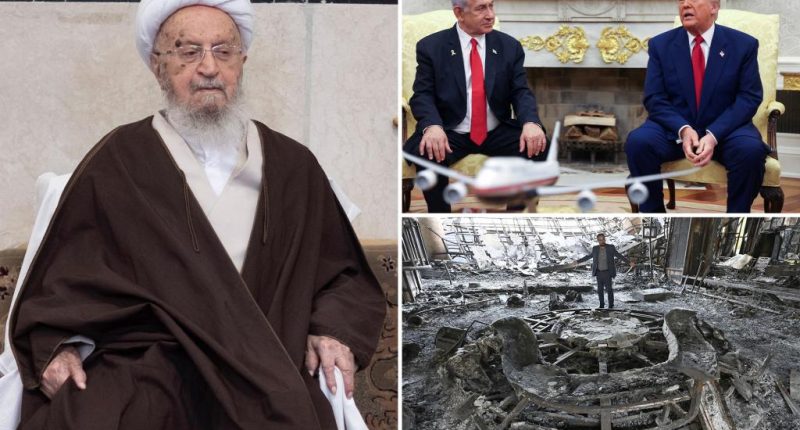Share this @internewscast.com

The leading Shiite cleric in Iran declared a religious decree targeting President Donald Trump and Israeli Prime Minister Benjamin Netanyahu on Sunday, which some experts described as an incitement to terrorism.
The fatwa from Grand Ayatollah Naser Makarem Shirazi called on Muslims around the world to take a stand, according to the New York Sun.
The decree declares that any person or government that poses a challenge or threat to the leadership and unity of the global Islamic community (the Ummah) should be labeled as a “warlord” or “mohareb,” meaning someone who wages war against God.
Under Iranian law, those identified as mohareb can face execution, crucifixion, limb amputation, or exile.
“Those who pose a threat to the leadership and integrity of the Islamic Ummah should be viewed as warlords,” Makarem stated in the decree. He concluded with a prayer for protection from these “enemies” and for the rapid return of the Mahdi, a messianic figure in Shiite Islam.
British-Iranian commentator Niyak Ghorbani condemned the fatwa, describing it as a state-endorsed incitement to global terrorism.
He posted on his X account that the Islamic Republic’s aggression is not limited to domestic dissent but signals broader international ambitions for religiously motivated violence.
“The West must realise: the Islamic Republic is not only targeting its own people — it is preparing for global violence in the name of religion,” he wrote in the post.
This fatwa followed what has been dubbed the “12-Day War,” during which American and Israeli efforts reportedly inflicted significant damage on Iran’s nuclear capabilities.
On June 13, Israeli airstrikes targeted Iranian nuclear and military facilities, reportedly killing top scientists and commanders. In retaliation, Iran launched ballistic missiles at Israeli cities.
The US joined the conflict a week later, striking three Iranian nuclear sites.
Trump had earlier warned that any further enrichment of uranium by Iran to weapons-grade levels would provoke additional American action.
This warning followed a brief ceasefire that ended a 12-day period of intense conflict.
It is not the first time Iranian clerics have used fatwas to incite violence.
The most infamous case was the 1989 decree against author Salman Rushdie after the release of his novel “The Satanic Verses,” which many Muslims considered offensive.
That fatwa forced Rushdie into hiding, led to the murder of a Japanese translator, and multiple attacks on the book’s publishers.
Rushdie has survived multiple assassination attempts since, including a 2023 stabbing attack in upstate New York in which he lost an eye.

















